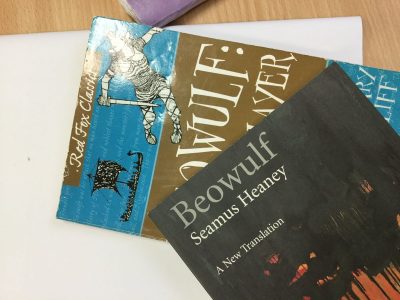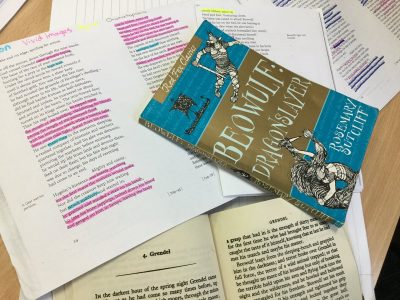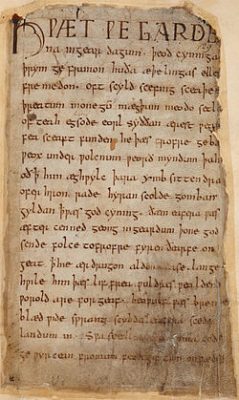English Literature to the fore.
English Literature is full of glorious gems – from Shakespeare to Austen, from Chaucer to Hilary Mantel, books enrich all our lives. But this term, Form III have explored even deeper.
Form III have been studying what is possibly the oldest surviving long poem in Old English: Beowulf. Its date is unknown but the earliest manuscript was produced between 975 and 1025. Set in Scandinavia it is the story of the hero, Beowulf, who comes to the aid of the king of the Danes by battling the monster, Grendel.
Kara Irvine, Form IIIA, introduces Form III’s research: ‘This term Form III have been studying the Anglo-Saxon poem Beowulf. During the course of our studies we have made a comparison between two translations of the work. One prose version by author Rosemary Sutcliff and the other in verse by Seamus Heaney, Here is an example of one of the comparisons by Naomi Nnatu, Form IIIA:

‘Firstly, Rosemary Sutcliff writes “In the darkest hour of the spring night, Grendel came to Heorot” whereas Heaney writes “In off the moors, down through the mist-bands, God-cursed Grendel came greedily loping.” Heaney’s opening sentence sets the atmosphere, which is eerie and tense, very well. However, Sutcliff’s version is not as dramatic and so it doesn’t create such an electric mood as does Heaney.

I find that Heaney writes with more power. Instead of saying “tore him limb from limb and drank his warm blood” as Sutcliff does, he writes “… bit into his bone-lappings, bolted down his blood and gorged on him in lumps..” This automatically creates a vivid image in my head of a demonic monster ripping man apart. Sutcliff’s lacks excitement compared to Heaney’s.
Many of the class enjoyed both versions, but perhaps there was a leaning towards Heaney’s for the more muscular language and striking imagery. Since Heaney’s version of the poem was in verse his work was more forceful in the way it sounded on the ear.’



